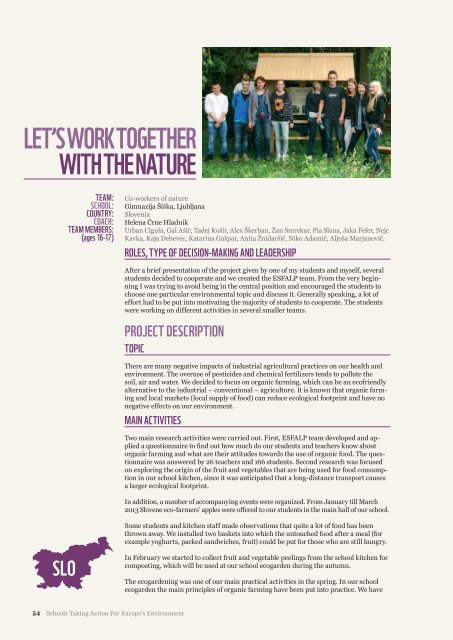esfalp_v_-_web_small.pdf - European schools for a living planet
esfalp_v_-_web_small.pdf - European schools for a living planet
esfalp_v_-_web_small.pdf - European schools for a living planet
- No tags were found...
Create successful ePaper yourself
Turn your PDF publications into a flip-book with our unique Google optimized e-Paper software.
Let’s work togetherwith the natureTEAM:SCHOOL:COUNTRY:COACH:TEAM MEMBERS:(ages 16-17)Co-workers of natureGimnazija Šiška, LjubljanaSloveniaHelena Črne HladnikUrban Cigula, Gal Ašič, Tadej Košir, Alex Škerban, Žan Smrekar, Pia Slana, Jaka Fefer, NejcKavka, Kaja Debevec, Katarina Gašpar, Anita Žnidaršič, Niko Adamič, Aljoša Marjanovič.ROLES, TYPE OF DECISION-MAKING AND LEADERSHIPAfter a brief presentation of the project given by one of my students and myself, severalstudents decided to cooperate and we created the ESFALP team. From the very beginningI was trying to avoid being in the central position and encouraged the students tochoose one particular environmental topic and discuss it. Generally speaking, a lot ofef<strong>for</strong>t had to be put into motivating the majority of students to cooperate. The studentswere working on different activities in several <strong>small</strong>er teams.PROJECT DESCRIPTIONTOPICThere are many negative impacts of industrial agricultural practices on our health andenvironment. The overuse of pesticides and chemical fertilizers tends to pollute thesoil, air and water. We decided to focus on organic farming, which can be an ecofriendlyalternative to the industrial – conventional – agriculture. It is known that organic farmingand local markets (local supply of food) can reduce ecological footprint and have nonegative effects on our environment.MAIN ACTIVITIESTwo main research activities were carried out. First, ESFALP team developed and applieda questionnaire to find out how much do our students and teachers know aboutorganic farming and what are their attitudes towards the use of organic food. The questionnairewas answered by 26 teachers and 166 students. Second research was focusedon exploring the origin of the fruit and vegetables that are being used <strong>for</strong> food consumptionin our school kitchen, since it was anticipated that a long-distance transport causesa larger ecological footprint.In addition, a number of accompanying events were organized. From January till March2013 Slovene eco-farmers’ apples were offered to our students in the main hall of our school.Some students and kitchen staff made observations that quite a lot of food has beenthrown away. We installed two baskets into which the untouched food after a meal (<strong>for</strong>example yoghurts, packed sandwiches, fruit) could be put <strong>for</strong> those who are still hungry.SLOIn February we started to collect fruit and vegetable peelings from the school kitchen <strong>for</strong>composting, which will be used at our school ecogarden during the autumn.The ecogardening was one of our main practical activities in the spring. In our schoolecogarden the main principles of organic farming have been put into practice. We have54 Schools Taking Action For Europe’s Environment



